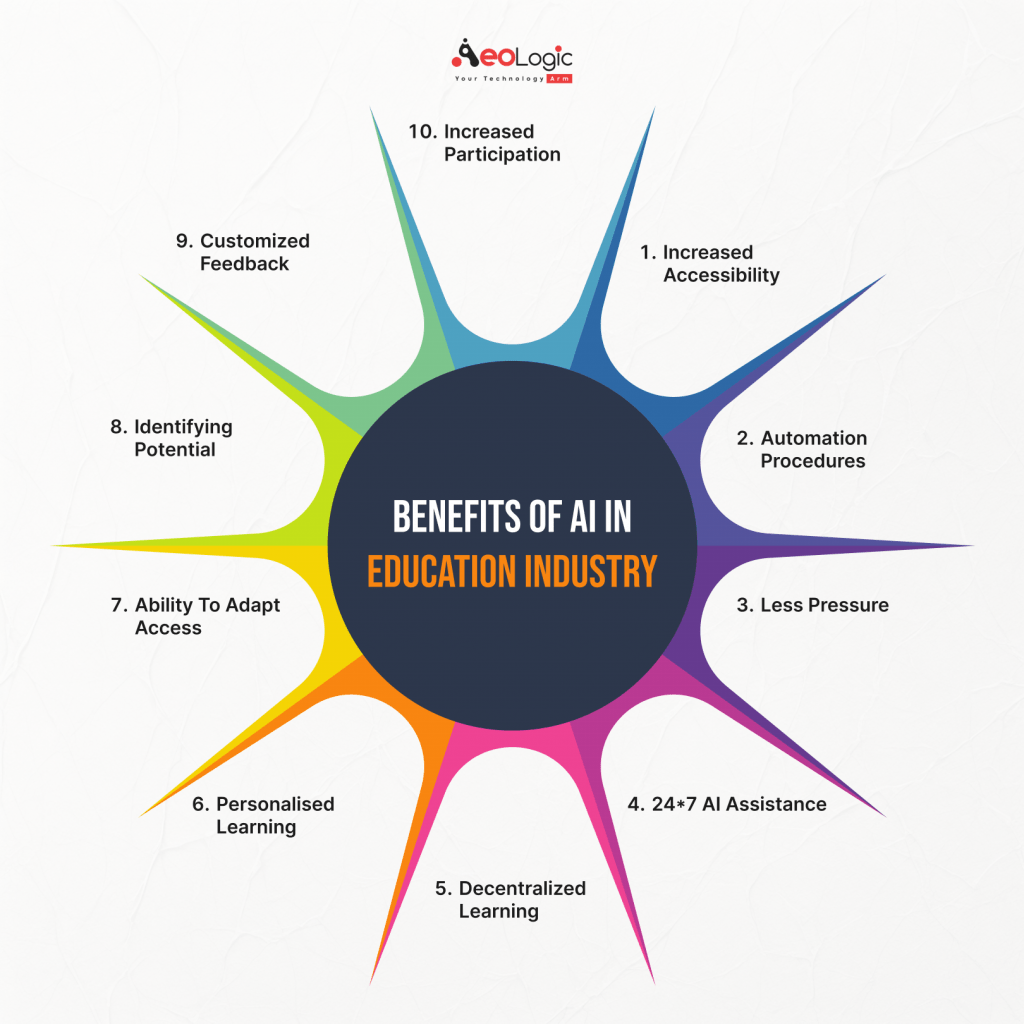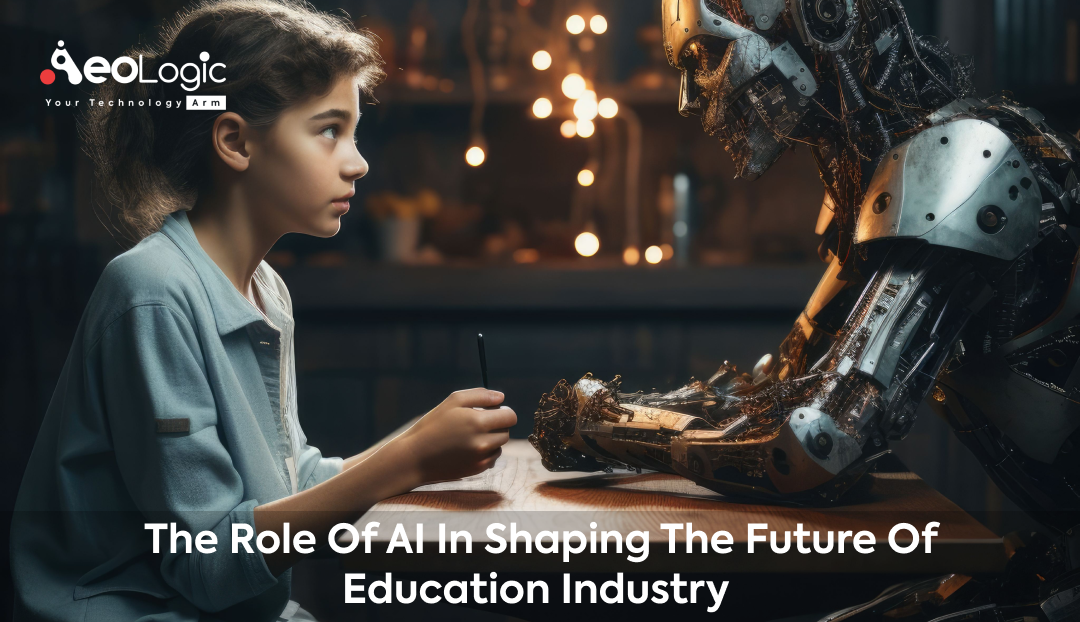The vast development of AI and its application in various areas has adapted to our daily routine, considering every field unimaginably possible. On the other hand, artificial intelligence has become one of the powerful tools that have changed work and way learning not only rapidly but also in a nice manner across several disciplines such as construction, education and sports. With Artificial Intelligence in education now, educators can develop platforms that give students an opportunity to tutor even at young ages.
To begin, let’s take a quick look at the prospects of the education technology industry that is driven by artificial intelligence.
10 Benefits of AI in Education Industry

Because it offers an array of advantages, artificial intelligence in education simplifies a variety of jobs and makes the process of learning less complicated. Let’s take a look at the 10 most prominent examples of artificial intelligence (AI) impacting the education industry, where the technology is transforming learning and education.
1. Increased accessibility
The use of artificial intelligence is assisting in the development and improvement of technologies that provide a learning environment that is more accessible and inclusive towards all individuals. Accessibility is of the utmost importance for students with impairments, who may have difficulty in conventional learning environments, let alone when they are provided with fewer resources while they are away from the classroom.
Students who are deaf or hard of hearing, for example, could benefit from audio conferences but they are not supported. Because of this, the artificial intelligence speech recognition software that Aeologic offers for educational institutions, which assists in the process of converting audio into transcriptions, has proven to be an extremely useful instrument for individuals who want further assistance.
Also Read: Impact of Artificial Intelligence on the Future of Workforces
2. Automation Procedures
Several processes can be simplified with the assistance of automation. Students can have access to a text-based version of a lecture through a process known as transcription of a video lesson. This allows students to reference the text-based version of the lecture at a later time as academic material.
However, to accurately transcribe films, for instance, the implementation of the appropriate technology is necessary. There are billions of distinct mathematical computations that the artificial intelligence voice recognition technology needs to comprehend to keep up with the various accents and speech patterns that need to be taken into consideration. At Aeologic, speech recognition engine is trained to recognize a vast number of words and terms automatically. This training can even result in real-time transcription, which enables students who have difficulty hearing to follow lectures at the same time as their peers.
Also Read: How AI-Powered Automation Can Enhance Business Growth
3. Less Pressure
In the process of learning, trial and error is an essential component. The feeling of being unable to answer a question or failing a test can be paralyzing for pupils. In many cases, they do not enjoy being put in a position where they are at risk of being incorrect. (https://artandhistory.org/) The use of artificial intelligence makes it feasible for pupils to respond and explore in an atmosphere devoid of criticism. The ability to respond to student faults by providing improvement solutions is a capability of AI tutors. As a result of the fact that artificial intelligence systems often acquire knowledge through a process of trial and error, this format is ideal for instruction of this kind.
4. 24*7 Conversational AI Assistance
It is becoming increasingly common to see chatbots as an example of how artificial intelligence in education uses data to inform and provide support in a manner that is appropriate. Not only does this benefit business executives, but it also aids teachers in terms of user participation in customized learning.
Conversational Artificial intelligence in education provides intelligent tutoring by carefully observing the pattern of content consumption and responding to the demands of the students in accordance with that pattern. Individuals from all over the world choose to participate in corporate training and distance learning programs because they do not require them to take time away from their jobs, families, or studies. Here, artificial intelligence chatbots can answer questions about registration, provide fast solutions, give access to necessary study material, and provide assistance around the clock.
5. Decentralized Learning Systems
Despite the fact that the education sector is providing quick advances with artificial intelligence, it is frequently hampered by difficulties such as data protection, accessibility to data that can be altered, obsolete certification procedures, and so on. With all of these obstacles, artificial intelligence-based decentralized solutions have the potential to bring about a good technological revolution in the education industry.
6. Personalized Learning
Not every kid is able to adjust to new information in the same way. Some people catch on fast, while others require more time. Within the framework of the traditional educational system, the idea of individualized instruction for each and every student was absent. When it comes to online education, artificial intelligence comes to the rescue. Just imagine that every student could use AI tools for free and learn without obstacles. Whether it’s completing homework, honing writing skills, or learning a new language, there are plenty of diverse and useful tools available for every student.
The use of artificial intelligence in the field of education guarantees that educational software is customized for each and every person. In addition, support technologies in education, such as machine learning, allow the system to support how the student understands different teachings and adapt to that process in order to reduce the amount of work that the student has to do.
The combination of artificial intelligence with education is designed to cater to the specific needs of each individual by using AI-powered games, individualized programs, and other characteristics that facilitate efficient learning.
7. Ability to Adapt Access
Users are now able to take advantage of the benefits that artificial intelligence (AI) has to offer in the field of education because they have complete access to it. According to a recent poll, more than sixty percent of educational organizations rely on artificial intelligence and machine learning-based education app development that is supported by contemporary tools and features. Because of features such as support for several languages, material may be translated into a variety of languages, making it easier for every native speaker to teach and learn this language.
There is also a significant role for AI in the education of audiences that are visually or aurally challenged. Converting technologies that are powered by artificial intelligence, such as Presentation Translator, offer real-time subtitles for virtual courses.
8. Identifying Potential in the Classroom
Keeping a positive impact on our environmental footprint through the use of remote learning is one of the significant benefits that artificial intelligence technology brings to the educational sector. On the other hand, many experts are of the opinion that artificial intelligence will soon replace the human touch in the learning process. However, this is not the situation in the education sector. It is possible that this is the case in other industries. Education and artificial intelligence go hand in hand, complementing both traditional and online instruction.
Artificial intelligence is basically a tool that assists professionals by enhancing the learning and teaching process for individuals.
Also Read: The Role of Artificial Intelligence in IT Operations
9. Customized Data-Based Feedback
Feedback is an essential component in the process of building learning experiences, regardless of whether they are being taken in a classroom or in a corporate setting. One of the most important distinctions between good teaching and merely disseminating information is that effective teaching involves providing ongoing feedback to students. Because it is crucial that feedback originates from a reliable source, artificial intelligence in education evaluates and decides work reports based on data that is collected on a daily basis.
A feedback system that is based on data makes students feel more satisfied, eliminates the element of prejudice that is present in the learning process, and assists in identifying areas in which they are weak in skills. All of the students and employees whose performance is tracked in the system are given feedback that is customized to their specific needs.
10. Increased Participation and Involvement
It is possible for artificial intelligence to aid with the digitalization of information in order to attract the attention of students and ensure that instructional materials are absorbed. It is possible to extract and make use of data with simplicity if paper documents, including handwritten notes, are digitized with the use of this technology.
Also Read: How AI is Helping Business Get Off the Ground
Final Words
Undoubtedly, AI in education has brought so many changes to the schooling. Innumerable companies already use AI in order to empower the life of students and their educational dimension. In the area of education, some companies have artificial intelligence chatbots that students can always seek to call while others switch on AI algorithms that allow detecting struggling pupils and giving them focused interventions.
You should think about incorporating generative AI consultancy into your business strategy if you want to boost your education business. The return on investment (ROI) will be good in the long run, making it a smart investment.










